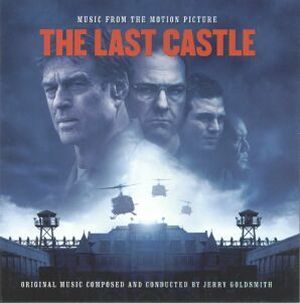Jerry GOLDSMITH
The Last Castle
OST
DECCA 440-016-193-2 [43:08]

Director Rod Lurie's notes for this standard issue CD release express his belief that Goldsmith's score to Lurie's "The Last Castle" will "help to cement Jerry Goldsmith as the maestro of our time." A stretch, considering he is already firmly cemented as one of the most prolific, artistic, and financially successful composers alive; and the matter of who is the Maestro is of course fodder for inane Internet polls, the sort invariably aimed at something other than good reason.
That curiosity aside, Goldsmith's score is enjoyable. After taking a page from John Williams' "Born on the Fourth of July" in its evocative, minor-keyed trumpet theme for the American hero, amplified by ambient chords in the strings and electronics, the score enters familiar Goldsmith territory. Also in his notes, Lurie mentions the score to "MacArthur" as one of the reasons he hired Goldsmith for his film. The directly stuck piano wires from that score reappear here, or at least their programmable equivalent. Synthesizers & drum machines, crisp string writing, and his trademark brass section (cue the French horns) get into gear. What drama falls due to cliché is picked back up by solid action music, which at times actually seems to be charging somewhere. (The occasional rhythm of "Shave and a Haircut" is a bit distracting, so beware the temptation to chime in, Roger Rabbit-style, with "Two bits!") We have heard this brand of scoring out of Goldsmith several times before (namely, the "Rambo" films), but thanks to his talent it does still pack some excitement.
Complaints about the sound quality of the album abound online, and I vouch for their validity. It sounds slightly grainy and has crackles, presumably from digital compression. At no time was the music ruined for me as a result, but my specialty is not in audiophilia. More troubling to me is the labeling of the motion picture's theme as 'September 11, 2001'. That was well intentioned, but inappropriate. The film's story outlined in the soundtrack's press release is that a decorated U.S. general is court martialed and sent to a military prison, where he wages an escalating battle against a merciless warden. While the theme symbolizes patriotism and is probably fitting, it was clearly composed for the film, not in reference or remembrance of recent tragedies. Re-naming the cue after the fact to capitalize on the events was presumptuous and possibly self-serving, even assuming intentions were the best.
But that is a digression.
"The Last Castle" cannot help Jerry Goldsmith, but it sounds as though he helps it. By the closing moments of the album it becomes clear that "The Last Castle" is an average Jerry Goldsmith score that, though dulled with meandering familiarity (and undermined by the inclusion of a couple of 'working' songs: John Hammond's "Get Behind the Mule" and Dean Hall's "Chiseled in Stone"), has its moments of individuality that somehow work their way in despite the obvious.
Jeffrey Wheeler

Return to Index